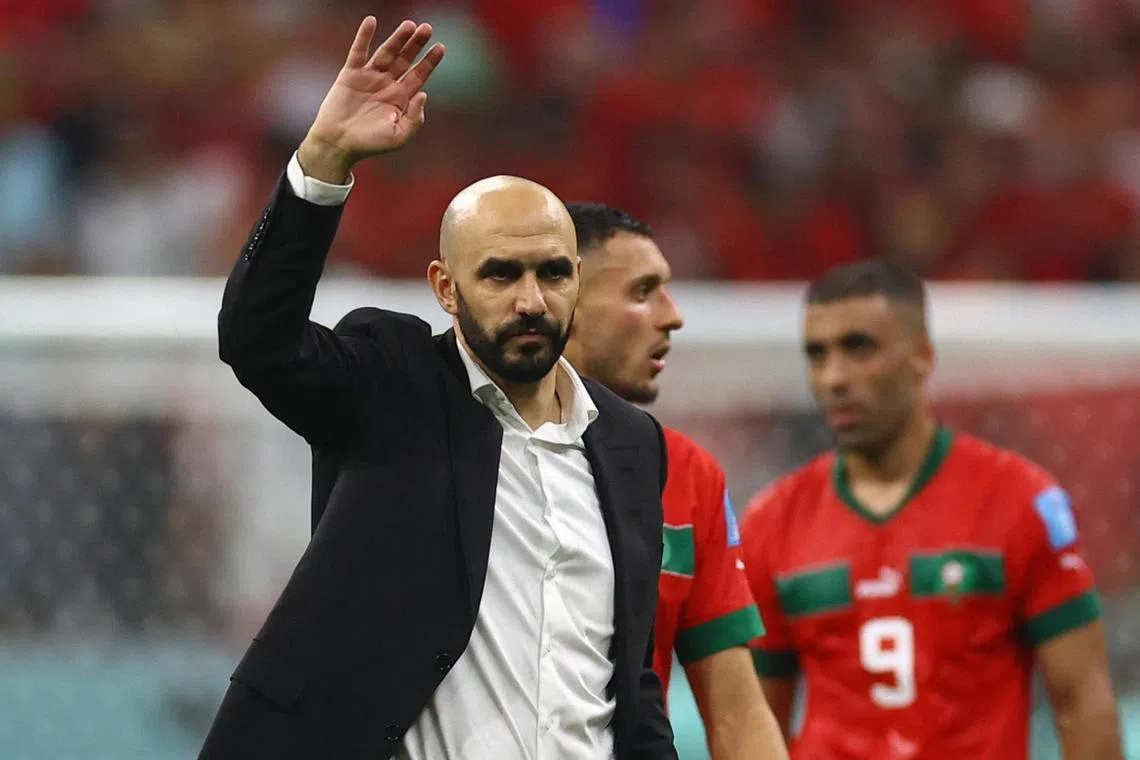World Cup: Semi-final defeat doesn't wipe out success, says Morocco coach Regragui
Sign up now: Get the biggest sports news in your inbox

Coach Walid Regragui acknowledges the fans after the semi-final match as Morocco are eliminated from the World Cup on Wednesday.
PHOTO: REUTERS
Follow topic:
AL KHOR, Qatar – Morocco coach Walid Regragui has hardly put a foot wrong in his team’s dream World Cup run, but he might come to regret the risk he took in fielding injured players, then seeing them forced to come off in Wednesday’s 2-0 semi-final defeat by France.
Nayef Aguerd was named in the starting line-up, but dropped out in the warmup while fellow centre-back and skipper Romain Saiss was forced off after 20 minutes.
Fullback Noussair Mazraoui joined them on the sidelines at half-time, with France 1-0 up through Theo Hernandez’s brilliant volley in the fifth minute. All three had been injury doubts ahead of the match.
Morocco’s rejigged team battled back strongly to put the holders under pressure until substitute Randal Kolo Muani’s 79th-minute goal ended the contest.
“We gave the maximum, that’s the most important,” Regragui said.
“We had some injuries, we lost Aguerd in the warm-up, Saiss, Mazraoui... but there are no excuses.
“We paid for the slightest mistake. We didn’t get into the game well. We had too much technical waste in the first half and the second goal killed us, but that doesn’t take away everything we did before.”
The 47-year-old said he changed his tactics defensively to try to deal with the speed of France’s wingers and it largely paid off until Kylian Mbappe delivered a mesmerising late run to set up the winner.
Having become the first African team to reach the semis, Morocco now face Croatia in the third-place play-off on Saturday.
“It will be difficult on the mental level,” Regragui added.
“I will give opportunities to those who did not participate and we will try to clinch the third place.
“The important thing is that we presented a good look to our team and that football in Morocco is not far from the top levels.”
Few can argue with his belief after Morocco’s heroics in Qatar.
At the final whistle, Regragui’s players collapsed onto their backs, all of the air drawn from them. For a while, it was possible to wonder if the tireless Azzedine Ounahi and Sofyan Amrabat, in particular, might need to spend the night there, and make their way home in the morning.
After a while, they lifted themselves up and formed, for a few minutes, a tight huddle with their teammates, listening as Regragui told them that Morocco’s king, Mohammed VI, was “proud of them, that the Moroccan people were proud of them, that the whole world was proud of this team”.
And then, as the applause rang out, they slowly approached their fans. On the edge of the penalty area, they stopped, and one by one they fell to their knees and lowered their foreheads to the grass.
Morocco had made it past Belgium and Croatia, Spain and Portugal, illuminating this tournament, inspiring a continent, reshaping the bounds of possibility.
Here, though, Regragui and his players could go no further, their journey drawing to a halt far later than they could have imagined, but not quite as far as they might, for a few days, have dreamt.
This, then, is where it ends. In the weeks, and months, and years to come, though, that is not how Morocco, or Africa, or all of those countries that have seen in Morocco a reflection of themselves will see it.
This World Cup, Morocco’s World Cup, will be remembered, instead, as a beginning. REUTERS, NYTIMES

